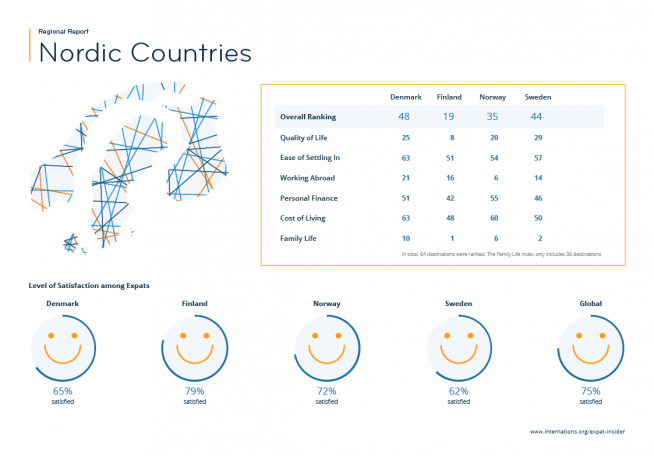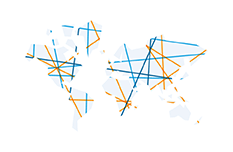It’s Cold Up North: Expat Life in the Nordic Countries
- All Nordic countries are among the top 10 in the Family Life Index.
- They also do well for digital life, safety and security, and health and well-being.
- Expats enjoy the work-life balance but are often dissatisfied with their career prospects.
- The high cost of living is a frequent cause for complaint.
- Expats throughout the region struggle with settling in.
Highly Recommended for Families
Regarding family life abroad, the Nordic countries truly shine. Finland has ranked first in this index since 2016 and also comes first in most subcategories. The winner is followed by neighboring Sweden (2nd out of 36 destinations). You can find out more about these two countries in the article on the Family Life Index.
Despite not making it into the top 3, the other two Nordics are among the top 10. Ranking 6th out of 36, Norway performs similarly to Sweden, with comparable strengths and weaknesses. It ranks best for the costs of childcare and education (3rd), as well as their availability (5th). Two in three expat parents in Norway (67%) think childcare is easily affordable; another 69% consider it easily available.
While Norway lands only in 14th place for family well-being, it lives up to its reputation as a safe destination for families. “My kids can grow up in a safe environment,” a US expat comments. Among parents, 92% are generally satisfied with their children’s safety in Norway (vs. 81% globally), the same share as in Sweden. Like in Sweden, parents aren’t enamored with the quality of education, however: Norway ranks just 28th, the worst result for Northern Europe.
Denmark places tenth in the Family Life Index, dropping six ranks compared to 2018 (4th out of 50). The decline is mainly due to its worse performance for the availability of education and childcare, as well as the quality of education. In 2018, Denmark still ranked 6th out of 50 for the latter, with 79% of expat parents judging it favorably; in 2019, only 66% do so, with the ranking falling to 24th place.
Denmark is a place I’d highly recommend for raising a family.
Denmark makes it into the top 5 (4th out of 36) for the costs of childcare or education, though. And while the results for family well-being are more of a mixed bag, parents praise their children’s health and leisure options (84% and 82% positive ratings, respectively). “It’s a place I’d highly recommend for raising a family,” says a respondent from India.
Global Leaders in Digital Life
The performance of the Nordic countries for quality of life is less stellar, ranging from 8th out of 64 destinations for Finland to 29th for Sweden. Once again, the four countries have quite a few things in common.
They do well with regard to digital life, health and well-being, and safety and security. Finland narrowly misses out on first place in the Digital Life subcategory (2nd out of 64). Even Norway, the worst-rated Nordic country for digital life, lands in eleventh place, with Denmark (6th) and Sweden (8th) somewhere in between.
While the Nordics rank badly for the ease of getting a local mobile number, they perform well for all other factors measuring digitalization. Finland makes it into the top 3 for the availability of government services online (3rd), high-speed internet at home (2nd), unrestricted access to online services (1st), and cashless payment options (1st). Up to 82% of expats in the region agree it’s very easy to pay without cash.
In the Health & Well-Being subcategory, Finland comes out on top again, ranking 1st out of 64, with Denmark, Norway, and Sweden following in 13th, 15th, and 17th place. All four receive a huge boost from the great quality of their environment.
Medical care also seems quite affordable across the region, with rankings ranging from an amazing 4th place in Denmark to an above-par 21st in Norway. However, expats aren’t always satisfied with its quality: four in five respondents in Finland (80%) rate this factor positively, but just 59% do so in Sweden.
Sweden doesn’t do as well as the others for personal safety, either, with a fairly average result (32nd out of 64). Denmark (20th) and Norway (14th) seem rather more appealing, though they are left behind by Finland (7th). Finland is also the only Nordic country where all three factors from the Safety & Security subcategory feature in the top 10. This includes political stability (7th) and peacefulness (2nd). A Hungarian respondent stresses that “as a woman, I feel very safe here”.
The results for the Travel & Transportation subcategory are nothing special. However, there’s always a huge gap between the ratings for the two underlying factors. In Finland, 91% of expats are happy with the transportation infrastructure, but only 61% are satisfied with their travel opportunities.
The two subcategories that drag down the rankings in the Quality of Life Index are Personal Happiness and Leisure Options. Denmark (63rd), Sweden (61st), and Norway (57th) end up among the bottom 10 for the former, and even Finland (43rd) scores clearly below average. Up to one in five expats in the Nordic countries (20%) describe themselves as unhappy, compared to 11% worldwide.
In Denmark, 13% of expats rate the available leisure activities negatively, and an even larger share (34%) aren’t happy with their personal socializing activities. The weather probably doesn’t help: all Nordic countries except for Norway (53rd) are among the bottom 10 for this factor.
Ideal for a Great Work-Life Balance
In the Working Abroad Index, results vary between a satisfactory 21st place for Denmark and a great 6th spot for Norway. Just for once, Finland — ranking 16th, two places behind Sweden (14th) — isn’t the best-rated country.
Life is more easy-going in Norway.
Any Nordic nation is ideal for expats looking for a less stressful life: Denmark and Norway are among the top 5 in the Work & Leisure subcategory, ranking third and fourth respectively. “Life is more easy-going in Norway than in Germany,” one respondent remarks; 71% positive answers for work-life balance prove her right. With an average full-time working week of 40.6 hours, expats in Norway do put in fewer hours than the average (43.9).
In the Economy & Job Security subcategory, the rankings range from great (Norway in 5th place) to good (Sweden in 9th place, Finland in 13th) to decent (Denmark in 23rd place). In most of these countries, the general state of the economy fares much better than individual job security. In Denmark, only 5% view the economy negatively, but 26% are unhappy with their own job security.
When it comes to career prospects and satisfaction, all Nordic destinations rank slightly below average at best (Norway in 38th place). In Sweden, 30% rate their career prospects negatively, and 29% of those unhappy with life abroad cite their inability to work as a reason. “Unless you work for an international organization, it's absolutely necessary to have Swedish language skills. And without personal connections, it’s extremely difficult to find a job at all,” a respondent from Sri Lanka sums it up.
Foreigners have to adapt to the Swedish way of talking, thinking, and acting, but the Swedes don’t need to do anything in return.
Expats are dissatisfied with their personal finances, too. Predictably, it’s worst in Norway, where fewer than three in five (58%) rate their financial situation positively. In three out of four destinations (Finland is the sole exception), an above-average share of working expats have a higher income from employment than back home — but the cost of living is even higher. In Denmark, 65% give the latter a negative rating (globally: 34%).
A Culture of Silence and Reservation
Personal finance isn’t the only area where the Nordic countries traditionally perform badly. The same applies to the ease of settling in, and this trend remains unchanged. Once more, Finland has the best result — if 51st place can be called good. While Norway (54th) narrowly escapes the bottom 10, there’s no such luck for Sweden (57th) or Denmark (63rd).
Expats in Northern Europe struggle, for example, with getting used to the local culture. In Denmark, 41% find this hard, and in Sweden, where 34% rate this factor negatively, a frustrated expat from the Netherlands claims: “The demand of almost all Swedes I meet is that foreigners have to adapt to the Swedish way of talking, thinking, and acting, but the Swedes don't need to do anything in return.”
It’s harder to make local friends here in Finland as the culture of silence and reservation is often emphasized.
Moreover, expats often have difficulties in finding new friends, especially local ones. Even in Finland, which ranks slightly better than the others (55th), only about one in four (24%) find it easy to make local friends, compared to 42% globally. “It’s harder to make local friends here than in other countries,” an expat from Hungary thinks, “as the culture of silence and reservation is often emphasized.”
This quote indicates that culture shock may play a certain role in the (perceived) lack of friendliness. No matter the destination, the Nordic people are often described as “cold” or “introverted”. Denmark shows an especially poor performance, landing in 63rd place, with 40% negative responses regarding the attitude towards foreign residents (vs. 19% globally).
The Language subcategory is the Nordic countries’ one saving grace in the Ease of Settling In Index. Here, Sweden does best, ranking 20th out of 64: 69% of expats consider it easy to get by without local language skills. They find it less easy to actually learn the language: Only 37% in Sweden and 39% in Norway agree. The figures for Denmark and Finland are far worse, with just 12% in either country.
Further Reading
- Expat Insider 2019 — Where Expat Families Love to Live
- Expat Insider 2019 — Press Release Denmark
- Expat Insider 2019 — Press Release Finland
- Expat Insider 2019 — Press Release Norway
- Expat Insider 2019 — Press Release Sweden
- Expat Insider 2018 — Safe & Healthy Family-Friendly Living in the Nordic Countries
- Expats in Denmark
- Expats in Finland
- Expats in Norway
- Expats in Sweden




